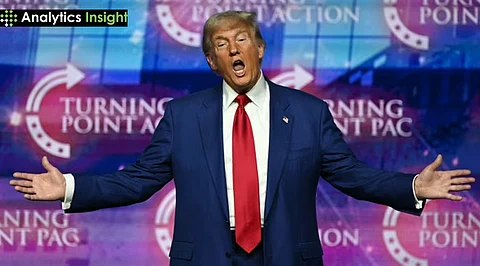

As Americans head to the polls, Wall Street is abuzz about the "Trump trade". It is a market strategy based on the belief that a Trump victory would strengthen the US dollar and support stock market growth.
Trump Trade talks come during a pivotal week, with US stocks closing slightly lower after a volatile session on November 4, 2024. Investors await both the election and the Federal Reserve's policy announcement.
Donald Trump and Kamala Harris have been going tremendous miles to outdo one another in this highly anticipated election. Polls seem to indicate a neck-to-neck competition, thus leading to a very unstable week in the market.
Some of the so-called Trump trades unwound as a recent poll showed Harris leading in Iowa, causing the ripple effect in the markets. The poll led to a decline in the US dollar, Treasury yields, and even bitcoin as Harris odds improved on several betting platforms.
Trump Media & Technology Group came back from a nearly 6% early deficit and closed up 12.37% in an extremely volatile session. The US dollar's path was still uncertain, though many had argued that if Trump won, this currency would strengthen on tax cuts and deregulation anticipation. However, a Harris win could leave it weak or make it weaker.
Major US indices mixed their sentiments. The Dow Jones Industrial Average declined 257.59 points, or 0.61%, to close at 41,794.60, the S&P 500 shed 16.11 points, or 0.28%, to 5,712.69. The Nasdaq Composite slid 59.93 points, or 0.33%, to 18,179.98. The benchmark 10-year Treasury yield dropped as much as 10 basis points, but it stabilized at 4.299%.
This stock market volatility will remain until the election results clearly show and investors understand a bit better what the government policy direction will be. At the same time, the Russell 2000 index rose 0.4% as falling yields tend to favour small-cap stocks as their sensitivity to interest rate moves is higher.
Key market sectors prepare for diverse election outcomes. Energy stocks gained with the surge in oil prices after OPEC+ delayed its plan to increase output, adding 1.87%. Technology was mixed as Nvidia added 0.48%, sending Intel's shares down 2.93%. This happened after it was confirmed the AI chipmaker, Nvidia would replace Intel in the Dow Jones Industrial Average.
Other sectors that have been affected due to Trump Trade are bank stocks. Bank stocks rose 8.5% recently based on the belief that a Trump administration could bring easier regulation to the financial sector. The market reaction was also apparent, as Bitcoin had jumped 13% earlier because some believed that Trump might be even friendlier to the digital asset.
Volatility had picked up with CBOE's VIX, commonly known as the "Fear Gauge," at 21.94, not far from its two-month high of 23.42. This, however, presents uncertainty in the background. Energy and technology stocks, along with some financial stocks, remain in focus as the investors try to figure out the policy impact. These stocks are the biggest parts of Trump Trade as a lot of growth was expected in the above sectors if Trump wins the US presidential elections.
It is speculated that the Federal (Fed) Reserve policy statement due on November 7, 2024, will include a Fed cut of 25 basis points. The CME's FedWatch Tool pegs the likelihood of that at only 98% with a possibility of a flat stance at just 2%. Lower interest rates continue to support areas that perform best in an accommodative monetary setting, namely technology and small-cap equities.
Utilities fell 1.21 per cent as the worst performer in the S&P 500, Constellation Energy, fell 12.46 per cent. It came on the heels of the Federal Energy Regulatory Commission rejecting a plan to increase the capacity of a power grid. This was regarding the expansion of an Amazon data centre that will consume power from the nuclear plant operated by Talen Energy in Pennsylvania.
Thus, the investors are being affected not only due to the Trump Trdaes and the upcoming US election results but with the Fed’s anticipated stance on the same.
Analysts like Sam Stovall, chief investment strategist for CFRA Research said the election is the big unknown unless it is resolved once and for all, and thus this week can get utterly haywire. The earnings are going well, and the Fed is likely to lower its interest rates, but the biggest uncertainty on the day of the election remains. " Hopefully that will be done sooner rather than later so investors can go back to investing," he added.
Trading volumes at 11.31 billion shares were less than the 20-day average of 11.71 billion, and investors await clarity of election results to cut down uncertainty.
As the US elections continue, the "Trump trade" has Wall Street on its radar, but volatility is probable to continue. The way the market dynamics are turning out is being influenced both by the new administration as well as by the cut in rates expected by the Fed.
Trump's policies might create short-term benefits in deregulated industries, such as energy and financial services. Harris’ lead in Iowa is shaking investor sentiments and Trump's support. Thus, the way forward remains uncertain for broader markets based on election outcomes and resultant policy decisions.
